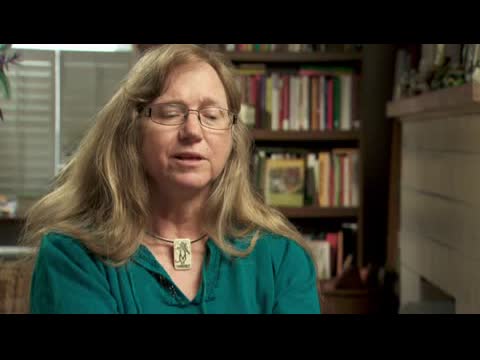Traditions: Ohio Heritage Fellows; 302; Lucy Long interview, part 1 of 3

- Transcript
Q:
LUCY: My name is Lucy Long. L-u-c-y L-o-n-g.
Q:
LUCY: Um, I’m a folklorist ethnomusicologist cultural anthropologist. I’m Director of the Center for Food and Culture and I’m an adjunct assistant professor at Bowling Green State University.
Q:
LUCY: Okay, well, (LAUGHING) RESTART
Mexican folkloric dance draws from the, the various dance traditions from the various regions of Mexico. Um, historically it would be the dances that were being done in villages and the dances that were being done on the holidays and festivals and just for fun, you know, for recreation. Uh, in the 1970’s people started taking those dances and presenting them on stages, um, so that other people would appreciate them and other people would learn to, could learn a little bit about Mexico. Um, also there’s a sense of, if we take these dances and sometimes they would kind of clean them up a little bit and put in maybe some choreography or maybe even some steps that would make them seem more sophisticated, it would get people to respect the dance itself more and then respect Mexican people. So, so there’s was kinda a movement to, to present the dances to outsiders as well as, as well as to themselves, um, to get people to feel, uh, feel proud of being Mexican. Um...
Q:
LUCY: Well, the, the roots of Mexican folkloric dancing, um, are the, the traditional dances that were done in villages in the different regions of Mexico. Um, generally people from those regions would then go to the cities and they’d introduce the dancing to people there and people who were, who were interested in, in promoting a sense of Mexican identity, um, then started looking for those dances and trying to preserve them, learn them themselves and teach them.
Q:
LUCY: Traditional forms like, like the folk dances are, are very important to, to preserve and to recognize because they, they embody the history of the people, they can tell us, um, what the environmental conditions were in, what the histories of colonization were, what the, the indigenous cultures were like in a prior to colonization but also how they were dealing with, with colonization. Um, so we can, we can ready history, we can read politics, we can read culture through forms like dance plus dance is fun, it brings people together, it’s an artistic type of form so that people can appreciate the esthetics of it regardless of what their own ethnicity is. So, it can be way to bring people together.
Q:
LUCY: Frequently...
- Episode Number
- 302
- Raw Footage
- Lucy Long interview, part 1 of 3
- Producing Organization
- ThinkTV
- Contributing Organization
- ThinkTV (Dayton, Ohio)
- AAPB ID
- cpb-aacip/530-4746q1tm50
If you have more information about this item than what is given here, or if you have concerns about this record, we want to know! Contact us, indicating the AAPB ID (cpb-aacip/530-4746q1tm50).
- Description
- Episode Description
- Raw interview with Lucy Long, folklorist, discussing Elaina Hernandez, expert of Mexican folkloric dance and founder of the dance group El Corazon de Mexico. Part 1 of 3.
- Asset type
- Raw Footage
- Genres
- Interview
- Topics
- Music
- Performing Arts
- Dance
- Media type
- Moving Image
- Duration
- 00:05:09
- Credits
-
-
Producing Organization: ThinkTV
- AAPB Contributor Holdings
-
ThinkTV
Identifier: Lucy_Long_interview_re_Elaina_Hernandez_part_1_of_3 (ThinkTV)
Duration: 0:05:09
If you have a copy of this asset and would like us to add it to our catalog, please contact us.
- Citations
- Chicago: “Traditions: Ohio Heritage Fellows; 302; Lucy Long interview, part 1 of 3,” ThinkTV, American Archive of Public Broadcasting (GBH and the Library of Congress), Boston, MA and Washington, DC, accessed December 18, 2025, http://americanarchive.org/catalog/cpb-aacip-530-4746q1tm50.
- MLA: “Traditions: Ohio Heritage Fellows; 302; Lucy Long interview, part 1 of 3.” ThinkTV, American Archive of Public Broadcasting (GBH and the Library of Congress), Boston, MA and Washington, DC. Web. December 18, 2025. <http://americanarchive.org/catalog/cpb-aacip-530-4746q1tm50>.
- APA: Traditions: Ohio Heritage Fellows; 302; Lucy Long interview, part 1 of 3. Boston, MA: ThinkTV, American Archive of Public Broadcasting (GBH and the Library of Congress), Boston, MA and Washington, DC. Retrieved from http://americanarchive.org/catalog/cpb-aacip-530-4746q1tm50